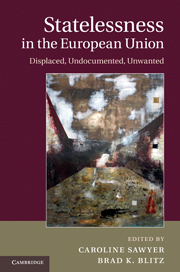Book contents
- Frontmatter
- Contents
- List of contributors
- List of cases
- List of conventions, covenants and treaties
- Acknowledgements
- List of abbreviations and acronyms
- PART I The issue
- PART II The research project
- 6 Research design and methodology of the country studies
- 7 De facto statelessness in the United Kingdom
- 8 Non-citizens in Slovenia: erasure from the register of permanent residents
- 9 The statelessness issue in Estonia
- 10 The sans papiers in France
- 11 Analysis: the practical and legal realities of statelessness in the European Union
- 12 Conclusions
- Bibliography
- Index
- References
8 - Non-citizens in Slovenia: erasure from the register of permanent residents
from PART II - The research project
Published online by Cambridge University Press: 17 February 2011
- Frontmatter
- Contents
- List of contributors
- List of cases
- List of conventions, covenants and treaties
- Acknowledgements
- List of abbreviations and acronyms
- PART I The issue
- PART II The research project
- 6 Research design and methodology of the country studies
- 7 De facto statelessness in the United Kingdom
- 8 Non-citizens in Slovenia: erasure from the register of permanent residents
- 9 The statelessness issue in Estonia
- 10 The sans papiers in France
- 11 Analysis: the practical and legal realities of statelessness in the European Union
- 12 Conclusions
- Bibliography
- Index
- References
Summary
For me, the most important right is the right to dignity, and that your dignity is not trampled in such a banal and total way.
(Iztok)We came here to work, to earn our living fairly, and then we were erased. Maybe we were too kind and prepared to take any kind of job and this was turned against us. They wanted to get rid of us – by humiliating us.
(Slavenka)I would like to stress again that I belong to this country, to Slovenia; this belonging is hundred per cent. This is how I feel. I perceive Slovenia as my home country despite the fact that I was born in Bosnia. I was educated in Slovenia, and my Slovene vocabulary is better than my Bosnian, my family is here, I have lost my ties to Bosnia. Once I lost my status [in Slovenia], as a foreigner I couldn't do anything, I felt redundant everywhere.
(Ivan)Introduction
The present territory of the Republic of Slovenia has been the scene of an eventful, but notably fast-paced history of political formations: a Slovene born in 1919, for example, has lived in several states: the Kingdom of Serbs, Croats and Slovenes (1918–31), the Kingdom of Yugoslavia (1931–41), the Socialist Federal Republic of Yugoslavia (SFRY, 1945–91) and the Republic of Slovenia (1991–). Each of these transitions brought about problems rooted in the particular epoch and geo-political configuration.
- Type
- Chapter
- Information
- Statelessness in the European UnionDisplaced, Undocumented, Unwanted, pp. 195 - 229Publisher: Cambridge University PressPrint publication year: 2011
References
- 5
- Cited by



